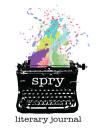Spry – 2013
Spry is a new literary journal that claims to be a place “for people who excel at taking risks.” And certainly, even in their very first issue, they have succeeded with this.
Spry is a new literary journal that claims to be a place “for people who excel at taking risks.” And certainly, even in their very first issue, they have succeeded with this.
Elizabeth Hilts’s creative nonfiction piece “A System of Linear Equations” shows the ways in which an adolescent can hide so many secrets: that she will fail her test that day, that she has been skipping gym class, and that she has a boyfriend whom she doesn’t love anymore, perhaps even like. The story takes the course of a single morning of a school day but tells so much so quickly with images of driving to school with her father, sitting and taking an Algebra exam, running out of school as a prank alarm goes off, and visiting her boyfriend. Hilts does a great job of placing us in the present, describing the scene as if we were there to experience it:
The hall is jammed with bodies and their smells—a whiff of sweet powder not quite mixing with pungent musk, a cloud of patchouli, hair spray, too much deodorant, desperate sweat and funk. The slippery susurrus of sand-clotted soles on the hard-polished mud-colored tiles is punctuated by the metal clang of lockers opening and closing, shrieks and whispers and muttered hellos. The fluorescent glare is softened by cloud-paled sunlight; it glows in the banks of windows at the ends of the hallway, creeps over the clerestory windows above the lockers.
Alan Shaw’s gutsy “Sex for the Recently Divorced” shows the shame and vulnerability of a person who has to learn to do something over again—in this case, have sex with a new woman. It’s a unique point of view on a subject I haven’t seen written about before. Followed by that piece is Amy Sibley’s “The Period Calendar,” and this is not punctuation we are talking about here. This, too, shows fear and shame and the difficulties of growing up, learning about your body, and becoming a woman. The writing is daring and honest.
Sheila Black’s “First Cigarette” starts with the perfect image: “I knew it was mine, the smoke pulled / in—the color like nylons without legs.” And on it goes with more powerful images, ones that are wonderful to read and ones that tug at the heart strings:
And later when my parents vanished up the
beach (sound of waves cast through
dimming air), and I stopped to take a
first taste from my father’s discarded
butt, I grasped that it was not smoke only,
but a space inside me, a vacuum that
hungered to be filled. Knew I would chose [sic]
that slow falling, carving away of breath to
feed that death inside me which glittered at times
like the sluice of water across the mountain-
Leigh Anne Hornfeldt’s poem “Strays” is about stray cats, but of course with most poetry, that’s only the surface of what it’s really about:
She loved him. Litters
of crying kittens all over
the neighborhood. Vagabond.
No good drifter. She
loved him. Half-an ear missing
kind of love. Born out of pity.
I won’t leave you
no matter what you do
desperate kind that keeps
a woman in dark glasses
even at night, the kind
that makes a woman go
weak, weaker, weaker, gone.
I could go on and on. While some new journals have a hard time finding enough to publish in their first issues, Spry certainly has their bases covered. There is a serious amount of nonfiction, fiction, flash, and poetry here to read, and it’s great writing.
[www.sprylit.com]






